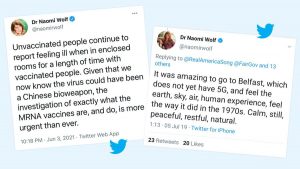Musk’s Changes at Twitter Moot Lawsuit Over Naomi Wolf’s Deplatforming–Trump v. Twitter

Putting aside whether that evidence is truly newly discovered, a lot has changed at Twitter since Trump/Wolf initially sued. Musk bought the company, lifted the anti-misinformation policies, and welcomed back many of the banned individuals–including Wolf. As the court says, “Twitter has restored Wolf’s account and she is currently tweeting with vigor and frequency.”
How do these recent developments affect her lawsuit? With Musk’s help, she got exactly the relief she asked for in her complaint. Indeed, according to Twitter:
since the restoration of Wolf’s account, Twitter “has affixed no labels to Wolf’s Tweets,” and “has not enforced any of its content moderation policies against her account”
“Twitter has also demonstrated that the changes are not transient. Twitter describes them as part and parcel of a fundamentally ‘different business vision articulated by the company’s new ownership.'” [That “fundamentally different business vision” has alienated many of Twitter’s legacy users. Follow me on Mastodon.]
Given the post-Musk developments, Wolf’s First Amendment complaints against Twitter are now moot.
If Wolf’s case is moot, how does that affect her appeal, along with Trump’s, pending with the Ninth Circuit? The panel has good reason to say it lacks the ability to hear the case and dismiss the appeal. Personally, I would prefer a mootness dismissal over an alternative where post-Musk Twitter changes its legal position and starts agreeing with Trump and the other plaintiffs in the 9th Circuit. As I’ve mentioned before, it’s a dangerous time in Internet Law when a major defendant like Twitter could flip its courtroom stance and reset legal principles for the entire industry.
Case citation: Trump v. Twitter, Inc., 2023 WL 1997921 (N.D. Cal. Feb. 14, 2023)